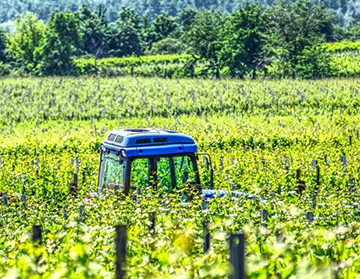New project on autonomous machinery for under-vine weed control
A new face in the Sustainable Winegrowing Australia team
Order the latest staff publications online
New project on autonomous machinery for under-vine weed control |
|
 |
TThe AWRI, in partnership with Pernod Ricard Winemakers, received a major grant from the Australian Government earlier this month for a project investigating autonomous machinery as an alternative to herbicides for controlling under-vine weeds. Funded under the Advancing Pest Animal and Weed Control Solutions Competitive Grant Round, the project will trial the use of an autonomous tractor and a vineyard robot for non-chemical weed control under Australian conditions. Project results will be communicated to growers via demonstrations in trial vineyards and through the AWRI’s established extension and communication platforms. The project will run until June 2023. |
A new face in the Sustainable Winegrowing Australia teamIn response to the growth of Sustainable Winegrowing Australia and new projects in the sustainability and viticulture space, last week Liz Pitcher joined the AWRI as Sustainability and Viticulture Specialist. Liz joins the team with twenty years’ wine industry experience across numerous regions and in various roles within small, medium and corporate wine industry businesses. She will work with Dr Mardi Longbottom and Megan Coles to manage Sustainable Winegrowing Australia and deliver certification training workshops and a range of other sustainability and viticulture projects. For more information about Sustainable Winegrowing Australia, visit the program website or contact the AWRI helpdesk on 08 8313 6600 or helpdesk@awri.com.au. |
|
Bucket ferment video |
|
| When a vineyard is exposed to smoke, the AWRI recommends a combination of analytical testing of grapes and sensory assessment of a small-scale ‘bucket’ ferment to assess the risk of making smoke-affected wine. To support producers who need to conduct such an assessment, the AWRI has recently made a video of the bucket ferment process to complement the detailed fact sheet that describes the method. This video is one of a number of demonstration videos now on the AWRI’s YouTube channel. A major collection of resources related to smoke taint are available from the AWRI smoke taint webpage. For more information on smoke taint, contact the AWRI helpdesk on 08 8 313 6600 or helpdesk@awri.com.au. | |
Do you read ‘Ask the AWRI’?Each month the AWRI helpdesk team publishes a short question and answer format article in Australian & New Zealand Grapegrower and Winemaker on a winemaking or viticulture subject. Recent columns have covered topics including regenerative agriculture, indole in sparkling wine, soil organic matter and even microwaving wine! The full collection of Ask the AWRI columns is available on the AWRI website. If you’d like to suggest a topic for a future column, contact the helpdesk team on helpdesk@awari.com.au. |
|
Botrytis webinars onlineWith recent wet weather experienced across a number of growing regions, some producers raised concerns with the AWRI helpdesk regarding Botrytis. In response, two panel-style webinars were held in successive weeks – the first focusing on managing late-season Botrytis in the vineyard, and the second on managing Botrytis-affected fruit in the winery. Both webinars are available for viewing on the AWRI’s YouTube channel and there are additional resources on the Managing Botrytis-affected fruit, must and wine webpage. |
|
Order the latest staff publications onlineAccessing the latest AWRI publications is easy. Visit the AWRI Publications web page to:
The AWRI’s most recent publications are listed below. 2198 Romanini, E., McRae, J.M., Bilogrevic, E., Colangelo, D., Gabrielli, M., Lambri, M. Use of grape seeds to reduce haze formation in white wines. Food Chem. 341: 128250; 2021. 2199 Tondini, F., Onetto, C.A., Jiranek, V. Early adaptation strategies of Saccharomyces cerevisiae and Torulaspora delbrueckii to co-inoculation in high sugar grape must-like media. Food Microbiol. 90: 103463; 2020. 2200 Nordestgaard, S. Sparking a vineyard revolution: Powering up the potential of electric tractors. Aust. N.Z. Grapegrower Winemaker (683): 32-34, 36, 38-40, 42-45; 2020. 2201 Godden, P. Ask the AWRI: Lees contact in white wine. Aust. N.Z. Grapegrower Winemaker (683): 55-56; 2020. 2202 Krstic, M. 2020 Report. Aust. N.Z. Grapegrower Winemaker (683): 76-79; 2020. 2203 Dry, P. Lambrusco Maestri. Wine Vitic. J. 35(4): p. 60; 2020. 2204 Sui, Y., McRae, J.M, Wollan, D., Muhlack, R.A., Godden, P., Wilkinson, K.L. Use of ultrafiltration and proteolytic enzymes as alternative approaches for protein stabilisation of white wine. Aust. J. Grape Wine Res. doi:10.1111/ajgw.12475: 1-12; 2020. 2205 Siebert, T.E., Stamatopoulos, P., Francis, I.L., Darriet, P. Sensory-directed characterisation of distinctive aromas of Sauternes and Viognier wines through semi-preparative liquid chromatography and gas chromatography approaches. J. Chromatogr. A 1637: 461803; 2021. 2206 Schulkin, A., Smith, P.A., Espinase Nandorfy, D., Gawel, R. A little dissolved CO2 goes a long way in the wine glass. Wine Vitic. J. 36(1): 39-41; 2021. 2207 Bekker, M., Espinase Nandorfy, D., Kulcsar, A., Faucon, A., Smith, P., Krstic, M. Choosing the best remediation strategy to remove ‘reductive’ aromas. Wine Vitic. J. 36(1): 42-45; 2021. 2208 McKay, S., Ismail, I., Harper, L., Lopez, F., van den Heuvel, S., Borneman, A., Hall, B., Sosnowski, M. Fungicide resistance status of powdery and downy mildew in Australia. Wine Vitic. J. 36(1): 54-58, 60-61; 2021. 2209 Dry, P. Moscato Giallo. Wine Vitic. J. 36(1): p. 68; 2021. 2210 Coulter, A. Ask the AWRI: Microwaving wine – a scientific perspective. Aust. N.Z. Grapegrower Winemaker (684): 44-45; 2021. 2211 Wilkes, E. Smoke analysis at the AWRI: a testing year. Aust. N.Z. Grapegrower Winemaker (684): 58-61; 2021. 2212 Dixon, R. Ask the AWRI: Applying regenerative agriculture practices in viticulture. Aust. N.Z. Grapegrower Winemaker (685) : 40-41; 2021. 2213 Gnoinski, G.B., Schmidt, S.A., Close, D.C., Goemann, K., Pinfold, T.L., Kerslake, F.L. Novel methods to manipulate autolysis in sparkling wine: effects of yeast. Molecules 26 (2): 387; 2021. |
|
AcknowledgementsThe AWRI acknowledges support from Australia’s grapegrowers and winemakers through their investment body, Wine Australia, with matching funds from the Australian Government. The AWRI is a member of the Wine Innovation Cluster in Adelaide, South Australia. |
|

